A place to let out your inner elitist movie snob... A movie review a day seemed like a good idea at the time... Now, I review what I can get to. Most reviews will have no score or letter grade, but the ones I repost from population GO will have the GO score visible. Post your comments, thoughts, arguments, criticisms, hatred, vitriol, and various lovely compliments in the space below each review.
Sunday, April 29, 2012
Day 126: M*A*S*H
"Well, goddamnit Hot Lips, resign your god damned commission!"
Robert Altman is a director I hadn't tackled yet during my year of movies. I had watched most of McCabe & Mrs. Miller a while back, but didn't review it, and I watched Gosford Park a few nights ago, but again, didn't review it. The other night, I found myself awake, wanting to watch something funny, and I turned to Altman's first big studio film, and one that hasn't aged a day in the 40+ years since its release, 1970's M*A*S*H.
For as revolutionary as it was upon its release, the film still feels like something fresh, new and original. Altman's undeniable contribution to film is the inescapable realism that film can provide an audience. From his famed overlapping dialogue to the focus on background characters doing seemingly nominal things that lend an air of verisimilitude unseen on screen before, Altman was an innovator like no other. The ultimate anti-establishment filmmaker, Altman wasn't happy unless he was ruffling feathers and sticking his middle finger up at a suit somewhere.
After the opening credits, copied almost shot for shot on the vastly inferior television spin-off, we're dropped right in the middle of a brave new world where characters speak at the same time, and one has to actually pay attention to what's being said if they have any hope of keeping up. We're quickly introduced to our ostensible hero Capt. Hawkeye Pierce (Donald Sutherland, in arguably the best performance of his career) as he waits by a jeep for a driver. When another Captain, Duke Forrest (Tom Skerritt) arrives, thinking that Hawkeye is his driver, the two steal the jeep and head off to their assignment as surgeons in a MASH unit during the Korean War. It's the first in a long line of acts that show these men as the kind with a blatant disregard for the rules. They're soon introduced to the first of their nemeses, their bunkmate Major Frank Burns (Robert Duvall).
By the time Hawkeye and Duke have requested a chest-cutter to make their surgical unit function better, they've already begun unraveling what little sense of order had been established at the camp. When the chest cutter, Trapper John McIntyre (Elliott Gould) shows up, the rulebook has been burned and is being re-written in their chaotic image. The film is essentially a series of vignettes strung together to present the American experience in foreign wars in microcosm. Incidents arise and resolve themselves quickly before moving on to the next one, such as the one that finds camp dentist Capt. "Painless Pole" Waldowski wanting to commit suicide after being unable to get it up during a recent sexual encounter. They stage a fake suicide for him, framed as a mockery of The Last Supper, complete with a faithful recreation of Michaelangelo's tableaux vivant that would make the most self-righteous audience member run for the doors, demanding a refund.
The performances are uniformly fantastic, with Sutherland & Gould anchoring the film, but the various supporting characters owning their small moments in the sun from Sally Kellerman's Hot Lips O'Houlihan to Rene Auberjonois' Father "Dago Red" Mulcahy to Roger Bowen's Col. Blake. It's a stellar ensemble that films would try to ape through the ensuing decades to lesser and lesser degrees of success.
Charges of misogyny plagued the film when it was released, but I feel as though it's Altman's refusal to sugarcoat the way military men truly behave (as boys) that makes these charges ridiculous. In much the same way similar charges have been leveled at the work of Brian DePalma, they are rendered absurd because anyone accusing these filmmakers of such charges is missing the point entirely. They take our most primal urges and desires, and actually have the gumption to portray them honestly on screen, falling victim to the very thing they themselves are condemning.
The Academy presented its Best Picture honors that year on Franklin Schaffner's Patton, a film that felt like a relic the moment it was released, but nobody with a brain in their skull would challenge for a moment that M*A*S*H is the more important, more vital and more groundbreaking work that actually went a long way toward rendering films like Patton as obsolete musings of a bygone era.
You could count on two hands the number of times The Academy has "gotten it right" in its 82 year history, and a Best Picture win for M*A*S*H may have actually gone a long way towards rendering it as an unimportant work. Thankfully it didn't and it isn't, and we can look back at M*A*S*H as the game-changer it truly was and continues to be, for as long as dialogue overlaps and as long as the horrors of war are depicted as being just that, M*A*S*H will insert its relevance in the minds of its viewers.
[Header Image]
Saturday, April 28, 2012
Day 125: The Raven
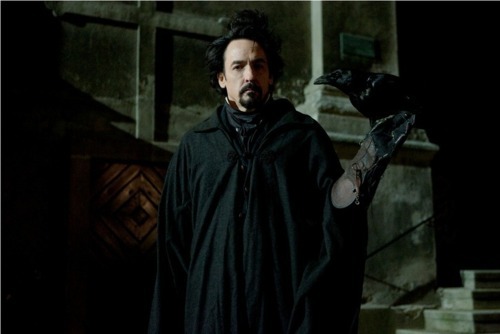
"If I had known that my work would have such a morbid effect on people, I would have devoted more time to creating eroticism."
I make a solemn pledge to you, faithful reader, not to use any bad Edgar Allen Poe puns in my review. The film opens with a specious scrawl that reads something to the effect of: "Edgar Allen Poe was found near death on a park bench on October 7, 1849. The last days of his life and circumstances of his death remain a mystery." It's a footnote of history that the film hangs its entire premise on, and it's just the kind of thing designed to inspire literary nerds to fall all over themselves as they clamor to the box office.
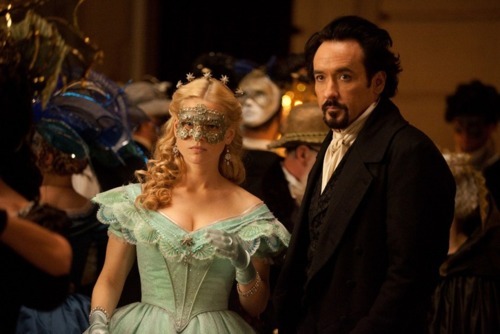
In the interest of full disclosure, I should admit that in a college playwriting course, I too based a short play on a footnote of history involving Poe's Annabel Lee and several ladies claiming to be its inspiration, so I felt like a kindred spirit to this film's screenwriters Hannah Shakespeare & Ben Livingston. I should also note that this film's marketing department should be drawn and quartered in a manner befitting the film's subject. The film is marketed like some sort of steampunk action nonsense, and that's so far from what the film is, I was embarrassed for everyone involved when I re-watched the trailer.
The film is part of the revisionist fad of the last few years, taking a famous person, in this case Poe (John Cusack), and putting them in a story that features some meta-twist on their lives. In this case, someone is re-creating the crimes of Poe's greatest literary works in real life, in some sort of attempt, at best, to coerce Poe into writing again, or at worst, implicating himself in a crime spree of his own design.
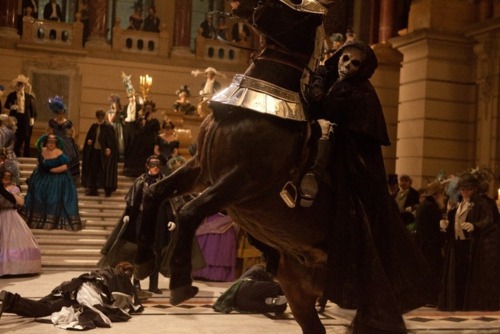
The first thirty minutes of the film are its most effective. Director James McTeigue (V For Vendetta, Ninja Assassin) establishes a world where a great artist such as Poe is shunned for his substantial vices, and everyone from the newspaper publisher Maddux (Kevin McNally) to the wealthiest man in town Capt. Hamilton (Brendan Gleeson) have dark secrets and potential motives that may imply them in the crimes unfolding on screen.
As for those crimes, someone is recreating famous deaths from Poe's canon (Murders in the Rue Morgue, The Pit & The Pendulum). When a desperate young detective named Fields (Luke Evans) finds himself at his wit's end with the murders, he enlists the help of the man who may have inspired the killer. Poe has issues of his own however, namely that the woman he loves, Emily (Alice Eve), is the daughter of the aforementioned Capt. Hamilton, who would sooner see Poe dead than with his daughter.
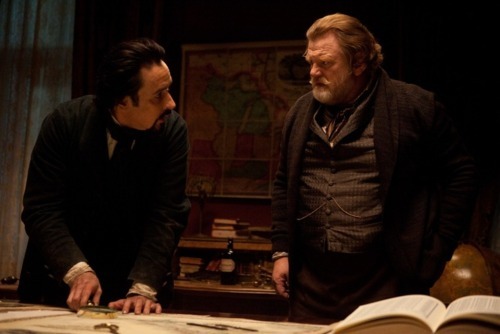
Clues left at the crime scenes lead Fields and Poe to believe that the killer's next crime will mimic the events of The Masque of Red Death, which takes place at a masquerade ball, which Capt. Hamilton is coincidentally planning for his daughter. At the ball, Emily is kidnapped, placing Fields and Poe on a deadline to find the killer and rescue Poe's beloved.
Let me start my critique of the film off by saying that, by and large, the film is better than it has any right to be. The trailers had me hornswoggled into thinking this was going to be an action extravaganza dressed up in ascots and pretension, with no literary sensibility whatsoever. It's actually quite the opposite. With the exception of a few gruesome murders, the film is fairly light on action and more involved with the mystery of who the murderer is, and will our heroes discover that fact in time to save Emily.
This last statement is also my biggest issue with the film. Ever since reading Brad Meltzer's stellar DC Comics limited series "Identity Crisis," I find myself reciting Batman's mantra every time I'm confronted with a mystery... "Who Benefits?" If you ask yourself this around the forty-five minute mark, you might not necessarily discover the killer's identity, but you'll have narrowed the suspects down to two, and it kind of ruins the fun that the film's creators had clearly hoped to create. The dearth of supporting characters also makes it relatively easy to whittle down suspects.
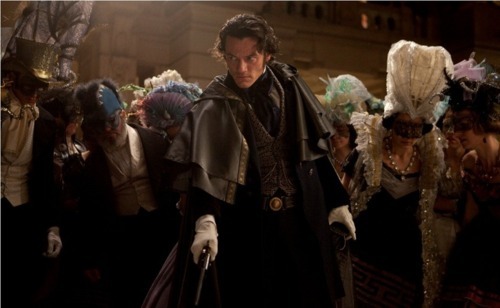
As far as the performances go, they're good across the board. No true standouts, save perhaps Brendan Gleeson, who's always great. Cusack isn't bad, but I question his casting in the first place. He's an actor who's at his best when his laconic, average guy charm slowly wins you over. Here, he just seems, and pardon the pun, "too old for this shit." He's not phoning in it, per se, but he's not having a whole lot of fun either, and it just makes me sort of question his participation in the entire endeavor.
Evans would likely be, for me, the biggest surprise. He's not an actor that I've seen in anything but nonsense like Clash of the Titans & Immortals, so he won me over pretty quickly, and while the film gives them little to do, he and Cusack make a pretty winning combination. Eve is perfectly suitable as well, always easy on the eyes, and not given much to do beyond the damsel in distress routine, but to play that kind of character without making the character shrill or one-dimensional is actually challenging, and she rises above it laudably.
Overall, I wouldn't run right out and see The Raven unless you're a die-hard Poe fan or a John Cusack completest (I used to live with one). It is a solid movie though, perfect for a fall night when you want to watch something other than the same old horror films. It's a surprisingly literate film, one that made me smile on more than a few occasions at how clever it could be, but one that also made me roll my eyes several times at how obvious it was being. It's a bit of a conundrum, much like Poe the man and Cusack the actor.
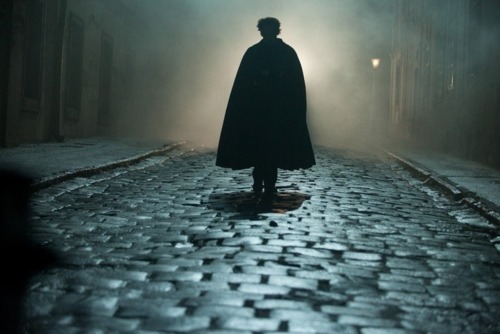
Go Rating: 3/5

[All photos via Box Office Mojo]
Tuesday, April 24, 2012
Day 124: The Innkeepers
"I'm not negative, I'm a realist, there's a difference."
Ti West's 2009 horror film House of the Devil is a mini-masterpiece of genre experimentation. It perfectly replicated the early 80s Satanic Panic films that were a staple of the mom & pop video stores I grew up in. I couldn't say enough good things about it in my review a few months back, and it was with breathless anticipation that I greeted the release of his newest film, 2011's The Innkeepers.
Where House of the Devil was made with loving care to look like a film that was actually made in the early 80s, The Innkeepers is very much a product of the year in which it was made. In fact, the story behind the story is that the hotel the film is set in, The Yankee Peddlar Inn, is where West and his crew stayed while shooting House of the Devil. Make no mistake about it though, West is a filmmaker much more interested in the slow building intensity that provides the true horror that most of us have come to seek in a horror film.
Owing a clear debt to Stanley Kubrick's The Shining, without ever trying to recreate that film's inimitable style, The Innkeepers is set on the last weekend in business of The Yankee Peddlar Inn, a real hotel in Connecticut. Claire (Sara Paxton) & Luke (Moby doppleganger Pat Healy) are the last two employees of the hotel, and they are on a quest to discover if there's any truth behind the ghosts that are rumored to be haunting the hotel. Armed with audio and video surveillance equipment, they set out to either capture these ghosts on tape, or dispel their existence (as much as that word can apply to ghosts).
Over the course of the hotel's last days, there are only four official guests on the books. A mother (Alison Bartlett, Gina from Sesame Street) and her son (Jake Schlueter), an aging actress from an old tv show (Kelly McGillis), who claims to have psychic abilities, and an old man (George Riddle) wanting to stay in the room he stayed in on his honeymoon decades ago.
The film ratchets up the intensity to almost unbearable levels, giving minor payoffs along the way through some well-placed jump scares, likely to induce laughter from the audience immediately after they've jumped out of their seats. And make no mistake, these are good old fashioned scares designed to give temporary relief from the building intensity, not cheap scares designed to goad you into being more scared than the film could ever hope to make you on its own.
West is a savvy enough horror master to pay-off on his multiple set-ups (Claire's incessant use of her inhaler after being scared, Luke's macho-facade, the old man's creepy appearance out of thin air on the hotel's last day in business). Breaking the film up into chapters is also another convention that West uses to maximum effect, giving the film an episodic style that befits its homage to The Shining. Just as the last twenty minutes of House of the Devil gives us everything we'd been promised in the previous hour and more, so too does The Innkeepers give in to your desire to see all the various set-ups paid off in the most intense way imaginable.
This is horror filmmaking that rewards patience and perseverance. Audiences raised on the torture-porn excesses of the latter half of the last decade will likely not have the fortitude to make it to the myriad pay-offs this film has in store for them. The popularity of the Paranormal Activity films has given me some hope that audiences have finally tired of the constant one-ups-manship of those films that seemed to dominate horror films of late.
The performances are all wonderful, with Paxton being a true stand-out. Much like Jocelin Donahue in House of the Devil, West has a wonderful knack for casting damsels in distress worth rooting for. Healy is also great as the typical apathetic & aimless thirty-something who's sardonic attitude masks a scared man-child beneath. McGillis is terrific as well, fitting well into the mold of an aging actress without a hint of vanity, much like her predecessor Mary Woronov in West's previous film. There's also a great cameo from indie it-girl of the moment, Lena Dunham, as a chatty barista.
While this film has no singular set-piece as phenomenal as the scene set to The Fixx's "One Thing Leads To Another" in House of the Devil, it's definitively more than the sum of its parts. The payoffs come fast and furious in the last thirty minutes, and it rewards your patience with genuine terror. I hate to say, "If you can make it past the first hour, you'll love it," because the first hour isn't some gauntlet to survive in order to enjoy what the film has to offer. It's all part of the ride, and if you can't hang with the first hour, it's probably not the film for you anyway.
PopGo Rating: 4/5

Ti West's 2009 horror film House of the Devil is a mini-masterpiece of genre experimentation. It perfectly replicated the early 80s Satanic Panic films that were a staple of the mom & pop video stores I grew up in. I couldn't say enough good things about it in my review a few months back, and it was with breathless anticipation that I greeted the release of his newest film, 2011's The Innkeepers.
Where House of the Devil was made with loving care to look like a film that was actually made in the early 80s, The Innkeepers is very much a product of the year in which it was made. In fact, the story behind the story is that the hotel the film is set in, The Yankee Peddlar Inn, is where West and his crew stayed while shooting House of the Devil. Make no mistake about it though, West is a filmmaker much more interested in the slow building intensity that provides the true horror that most of us have come to seek in a horror film.
Owing a clear debt to Stanley Kubrick's The Shining, without ever trying to recreate that film's inimitable style, The Innkeepers is set on the last weekend in business of The Yankee Peddlar Inn, a real hotel in Connecticut. Claire (Sara Paxton) & Luke (Moby doppleganger Pat Healy) are the last two employees of the hotel, and they are on a quest to discover if there's any truth behind the ghosts that are rumored to be haunting the hotel. Armed with audio and video surveillance equipment, they set out to either capture these ghosts on tape, or dispel their existence (as much as that word can apply to ghosts).
Over the course of the hotel's last days, there are only four official guests on the books. A mother (Alison Bartlett, Gina from Sesame Street) and her son (Jake Schlueter), an aging actress from an old tv show (Kelly McGillis), who claims to have psychic abilities, and an old man (George Riddle) wanting to stay in the room he stayed in on his honeymoon decades ago.
The film ratchets up the intensity to almost unbearable levels, giving minor payoffs along the way through some well-placed jump scares, likely to induce laughter from the audience immediately after they've jumped out of their seats. And make no mistake, these are good old fashioned scares designed to give temporary relief from the building intensity, not cheap scares designed to goad you into being more scared than the film could ever hope to make you on its own.
West is a savvy enough horror master to pay-off on his multiple set-ups (Claire's incessant use of her inhaler after being scared, Luke's macho-facade, the old man's creepy appearance out of thin air on the hotel's last day in business). Breaking the film up into chapters is also another convention that West uses to maximum effect, giving the film an episodic style that befits its homage to The Shining. Just as the last twenty minutes of House of the Devil gives us everything we'd been promised in the previous hour and more, so too does The Innkeepers give in to your desire to see all the various set-ups paid off in the most intense way imaginable.
This is horror filmmaking that rewards patience and perseverance. Audiences raised on the torture-porn excesses of the latter half of the last decade will likely not have the fortitude to make it to the myriad pay-offs this film has in store for them. The popularity of the Paranormal Activity films has given me some hope that audiences have finally tired of the constant one-ups-manship of those films that seemed to dominate horror films of late.
The performances are all wonderful, with Paxton being a true stand-out. Much like Jocelin Donahue in House of the Devil, West has a wonderful knack for casting damsels in distress worth rooting for. Healy is also great as the typical apathetic & aimless thirty-something who's sardonic attitude masks a scared man-child beneath. McGillis is terrific as well, fitting well into the mold of an aging actress without a hint of vanity, much like her predecessor Mary Woronov in West's previous film. There's also a great cameo from indie it-girl of the moment, Lena Dunham, as a chatty barista.
While this film has no singular set-piece as phenomenal as the scene set to The Fixx's "One Thing Leads To Another" in House of the Devil, it's definitively more than the sum of its parts. The payoffs come fast and furious in the last thirty minutes, and it rewards your patience with genuine terror. I hate to say, "If you can make it past the first hour, you'll love it," because the first hour isn't some gauntlet to survive in order to enjoy what the film has to offer. It's all part of the ride, and if you can't hang with the first hour, it's probably not the film for you anyway.
PopGo Rating: 4/5

Saturday, April 14, 2012
Day 123: The Cabin in the Woods
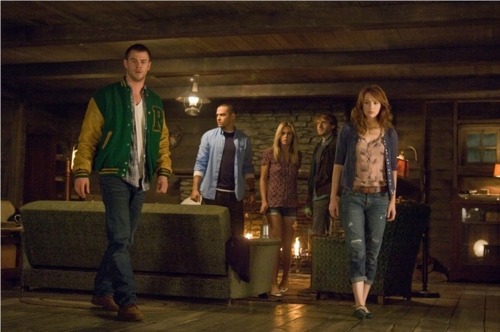
"Nemo... you gotta wake up man!"
I am thirty-two years old, and in my lifetime, there have been two horror films that have felt completely and totally revolutionary. You had the feeling when watching them that the horror genre was never going to be the same again. The first one was Scream, which I saw the night it opened to zero hype and fanfare, yet would go on to spawn three lackluster sequels and seem almost like a pale imitator of itself in retrospect.
This morning, I saw the other film, a film I knew nothing about, had seen no trailers for, read no reviews for, and I urge you, with every fiber of my being, to follow suit, and not read the rest of my review until you've seen The Cabin in the Woods for yourself. Please don't read on, lest you risk spoiling yourself to any of the myriad treasures of awesomeness this film has in store for you...

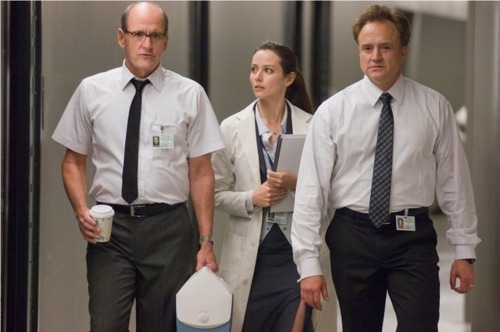
This is your last chance to turn back, I'm not going spoiler heavy in this review, but I sincerely think that knowing absolutely anything about this film ahead of time will ruin your enjoyment of it. The Cabin in the Woods was filmed somewhere around two years ago, and has sat on a shelf for some inexplicable reason. It is absolutely, hands-down, without a doubt, the most radical and imaginary horror movie of the last fifteen years.
The film is heavy on horror mythology, and the more steeped in the genre you are, the more you're going to enjoy the film. It plays on all your expectations, giving you winks and nudges as it doles out the tropes that we've come to rely on. If it wasn't so well written, it would almost seem aggravating in its eagerness to hit all the beats of "teenagers in the middle of nowhere" story you've seen a million times. Okay, this is officially your last chance to turn back and protect your innocence, plot details to follow..
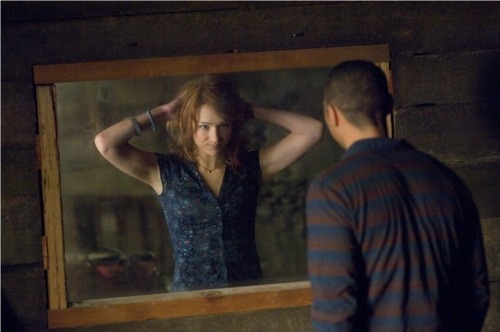
The film opens with two average corporate world joes, expertly played by Bradley Whitford & Richard Jenkins, going about their day, making small talk, and dropping hints that they have some sort of control over a social experiment involving teenagers. We are then introduced to our five teenagers who are unknowingly part of this "experiment," each of which fits a horror stereotype. There's Dana the virgin (Kristen Connolly), Curt the jock (Chris Hemsworth), Jules the whore (Anna Hutichson), Holden the brainy nice guy (Jesse Williams) and Marty the stoner (Fran Kranz, who bears an uncanny resemblance to District 9's Sharlto Copley). They are off to spend a weekend in an isolated cabin that Curt's cousin recently acquired, but they are also being monitored by Jenkins & Whitford, their every move commented on from a control room miles away, as if it has all been set up ahead of time.
The thing that immediately jumps out at you is how well these actors play both sides of the coin in regards to their character. They're very easily recognizable as the familiar character-types, but they also have more going on than the usual "type" in a horror film. Curt, for example, is a Sociology major, who gets angry when he thinks his girlfriend Jules has been reading a text book about Russian finance. Marty is also incredibly observant and has much more insight into the world and situation around them than your typical horror film stoner.
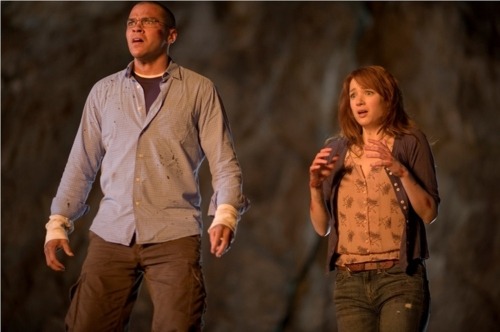
Bit by bit, the audience is clued into the true scenario going on, and it's much more than you could ever expect. There are hints and clues given along the way that make sense in retrospect, but going into the film cold, you'll never be able to figure out what on earth these people in the control room are actually up to. The way that film unfolds is fantastic, shifting your focus between the teens and the guys in the room, and treating the teens predicament as an after-thought at times, in a truly interesting way.
The film breaks ground left and right, setting up pins and knocking them down like crazy. Needless to say, the last twenty minutes or so, leave no stone unturned, and in the most brilliant stroke of all, they leave absolutely zero hope for a sequel. It's a ballsy move, but one that makes me bow to the film's superiority. This will not become another Scream and thank god for that. The world needs fewer sequels, and more originality in it, and it's refreshing to be presented with that attitude in a film like this.
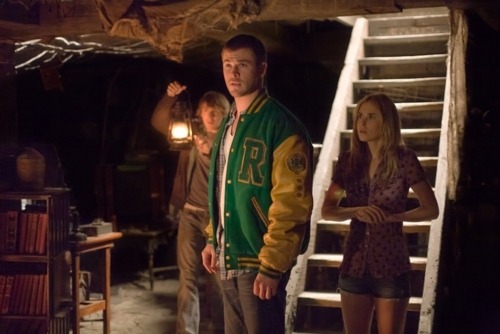
The film was directed by Drew Goddard, who co-wrote the script with geek god Joss Whedon, and while the film has Whedon's witty stamp all over it, it's Goddard's film top to bottom. No one will mistake this for a Joss Whedon film, and I don't think that's a bad thing. I love what he does, but it's nice to see him give someone with similar sensibilities a chance to create something wholly new and original.
The acting is great, across the board. All the teens are awesome, particularly Kranz & Hemsworth, but the film truly belongs to Jenkins and Whitford. They are actors that know how to make the most of roles like these, and they are ridiculously good in the film. I was shocked by how comedic the film was, and these two bring most of the funny. There's also a geek-tastic cameo at the end that will make you smile with delight, even though this person is underused at best.
I could wax rhapsodic about this film all night, and I would love to just sit and dissect this film with people who've seen it. I think word of mouth is going to make this film a solid hit for the rest of the month of April, as this was far and away the most diverse audience I've seen in ages. There were young people, old people, men, women, blacks, whites, Asians, every imaginable demographic was represented, and everyone was having a blast, laughing, shouting at the screen, and enjoying a truly fun, communal movie-going experience. That's a rare commodity in this day and age, and I can only hope this film gets the audience it deserves.
So, now that you've seen the film, let's talk... what did you think?
GO Rating: 5/5
[All Photos via Box Office Mojo]
Tuesday, April 10, 2012
Day 122: Extremely Loud & Incredibly Close
"People aren't like numbers, they're more like letters. And those letters want to become stories, and dad said those stories need to be shared."
What? This fucking movie, man. This fucking movie is so calculated and knowingly manipulative that anyone who sheds a single tear while watching it has fallen victim to a criminal act. For many years I thought that Amistad was the most shamelessly manipulative film ever made, the kind of movie made for no other reason than to win Oscars. My friend Jaime said my favorite thing about that movie: every time there was a shot of an actor talking, you could picture them in a little box in the bottom corner of the screen, in their tuxedo, at the Oscars. Amistad is awful, don't get me wrong, and it's shameless too, but it's a masterpiece of restraint when held up next to Extremely Loud & Incredibly Close.
First of all, shame on every notable actor in this film: Tom Hanks, Sandra Bullock, Viola Davis, Jeffrey Wright, John Goodman, Max VonSydow. They should have known better than to appear in such dreck. Maybe they wanted an Oscar a piece, but only VonSydow came close to that (though not really). The behind the scenes on this movie must have been like that awful Christopher Guest movie For Your Consideration where everyone just walked around talking about how they were gonna get nominated, and then only MVS pulled it off. In fact, I'd rather watch that movie again than this one. I'm amazed it wasn't included as a special feature on the dvd, because it's pretty much on the nose.
So what is this movie? It's the story of a precocious eleven year-old (though he was only nine in the book, which I read and liked because it wasn't all about 9/11. In fact, 9/11 had more screen time than almost all of the actors I mentioned in the last paragraph) named Oskar Schell (Thomas Horn) who's dad died in the WTC on 9/11. When his dad was alive, he used to send him on adventures, presumably because it kept him occupied as he's a bit rambunctious. There's talk that he may have Asperger's, but it's swept under the table as quickly as it's mentioned. Anyhoo, Oskar is digging in his father's closet after 9/11 (have I mentioned 9/11?) and he finds a vase that he accidentally shatters. Inside the vase is a key in an envelope with the word "Black" written on it. Convinced that it must be part of one last adventure his father intended to send him on, Oskar sets off to find out who and what the key belongs to.
Oskar digs through the phone book to discover there are 400+ people living in New York City with the last name Black, and has decided to visit every single one of them to find out how they knew his father or what the key unlocks. On a chance visit to his grandmother's apartment, he meets a mute old man (MVS) renting out a room in her apartment, who communicates only through writing things down, or flashing one of his hands that has either Yes or No written on it. Twee enough for you?
The renter agrees to join Oskar on his quest to help solve the mystery, and the film is ridiculously coy about trying to disguise the fact that of course the old man is his estranged grandfather. I hate comparing the film to the book, but the book never even hinted at this possibility until it was revealed. Here, you're so annoyed by how everything seems to be interconnected that this is the only possible resolution to their story.
The film actually starts out pretty good. I remember thinking the first twenty minutes or so were actually halfway decent, but once it becomes clear that the filmmakers latched onto the 9/11 thing and decided to frame every moment of the film in that tragedy's context, it struck me that the entire thing was just a bunch of weepy bullshit being made by someone who completely missed the point of the entire book. That someone would be notorious "everything is connected" hack Eric Roth, the guy behind the scripts for Forrest Gump & Benjamin Button. (to his credit, he was a credited writer on two great films The Insider & Munich, but the three screenplays I mentioned previously were all written solo by Roth).
Stephen Daldry is famous for one thing, and that is the fact that his first three films earned him Oscar nominations for directing (Billy Elliot, which I love, and The Hours & The Reader which I don't), so you just knew that this thing was gonna be Oscar-bait, but the degree to which it was nauseated me.
The fact that it actually scored a Best Picture nomination makes me ill. In fact, it may be the cause of my current head cold, though it probably isn't. The only possible equation I can give you for what this adaptation is if you haven't read the book, is that it would be like someone reading one of the Gospels and ignoring all of the teaching and miracles that Jesus performed and just focusing on the crucifixion, because that's the most emotionally draining stuff in the story, and the easiest way to manipulate the emotions of a viewing audience. Come to think of it, I think this has been done before as well.
Anyway, the good news is that you'd have to go out of your way to see this movie as it's only recently out on dvd, and redbox doesn't carry it yet, so please don't track it down. If you find yourself in a situation where you do end up seeing the movie, I implore you to read the book and see for yourself how ridiculously off this adaptation really is. But it would probably be best to just avoid all this nonsense altogether and just read Don DeLillo's Falling Man. It's actually about 9/11, and is much more emotional without being manipulative.
[Header Image]
Wednesday, April 4, 2012
Day 121: Titanic in 3-D
"Are you ready to go back to Titanic?"
I can't adequately express in words the dread that filled every inch of my being when James Cameron's 1997 epic Titanic began on my most recent viewing. It's such a long movie, I could feel myself getting bored before it even began. It doesn't help that the movie begins with over twenty minutes of modern day gobbledygook involving one of the worst actors in cinema history (Bill Paxton), and while I hate to say this, the movie would be infinitely better without this framing device. James Cameron has a well-documented hard-on for both deep sea diving and Paxton, so the sequence's existence is never really called into question. The movie is over fifteen years old though, so a bunch of Monday Morning Quarterbacking isn't going to do anyone any good, so let's talk about what works in Titanic, and why it endures.
James Cameron knows his way around a camera, that much is undeniable, but it's funny how many iconic images there are in this film. He frames shots in such a way that they engrain themselves in your memory and they're instantly recognizable, even if you're seeing them for the first time: Rose emerging from the carriage and seeing Titanic for the first time, the "King of the World" shot, Jack sketching Rose, "I'm Flying, Jack," there's lots of them. The film is also renowned, as are most of Cameron's films, for its ground-breaking special effects.
For as many great effects shots as there are in the film, there are also some laughably bad effects in the film, like the tiny pontoon boat that nearly gets run over by Titanic as it leaves port, and time has not been kind to the poor sap who hits the propellor when the ship breaks apart, but now I'm just nit-picking.
More than anything else, the biggest thing Titanic has going for it is the charisma of its two leads. Leonardo DiCaprio & Kate Winslet are ridiculously talented, and sell every aspect of their love story that you truly believe in it. Many people have unfairly compared Twilight to Titanic, and this distinction should signal the instantaneous death of any such comparisons. Rose is an independent woman, the kind that young girls can actually look up to, as opposed to some wilting teenage flower who needs various monsters fawning over her to make herself feel good.
All that being said, both actors would go on to do better work in much better films separately (The Departed & Eternal Sunshine, respectively, for just one example), and even together once more in Revolutionary Road, but their talent is extremely evident here. Cameron's writing has always been his Achilles heal, and its weaknesses really show in the character of Cal, Rose's fiancee, played by Billy Zane. He's the epitome of a one-dimensional, mustache twirling villain, the kind that sticks out in the worst way possible. Zane is a decent enough actor, and it's not entirely his fault his character is so ridiculously unlikable, but he's another in a long line of James Cameron villain that serves no purpose other than to give us no choice but to root for the protagonists.
There are also tons of great actors in smaller roles, from Victor Garber, best known as Mr. Bristow from Alias, as the ship's builder Mr. Andrews, Kathy Bates as (The Unsinkable) Molly Brown, Bernard Hill, Theoden from Lord of the Rings, as Captain Smith & David Warner from Tron & Time Bandits, as Cal's bodyguard. There are also some woefully miscast roles, like the Harry Knowles look-a-like on Bill Paxton's crew & Danny Nucci as Fabrizio, doing the most horrendously stereotypical accent this side of the Star Wars prequels.
The technical elements are all sound however. Russell Carpenter's cinematography is elegant & very classically realized, holding up in the best way possible, and even though I'd rather stab myself in the throat than hear that damn Celine Dion song again, James Horner's score is still very accomplished & compliments every scene incredibly well.
So, what about the 3-D? Well, it's used beautifully, particularly in the sinking sequence. The 3-D gives incredible depth of field to the ocean. It makes the vastness of the ocean feel dangerous, giving the direness of the survivors' plight an immediacy it did not have in two dimensions. Unfortunately, it's not essential to the storytelling, and I would question the necessity of it. Of course there's no way to go back and shoot the film for maximum 3-D effect, so it loses some of the incredibleness that Avatar or Hugo had, while still feeling breathtaking when it needs to. I found myself getting fatigued at points, like the dinner that Jack crashes, and the sheer length of the film makes the 3-D a bit taxing, but it does give the last hour and excitement it was lacking both on television and, to a lesser extent, in 2-D.
I remember seeing the musical of Titanic on Broadway in early 1998, not long after the film was released, and I connected with it to a much larger extent because it gave you multiple characters to care about. Here, if you don't care about Jack & Rose, you're sunk, but the Maury Yeston & Peter Stone musical gave the story a wide range of characters to care about across all three classes of passengers. I feel this is where the film falls short, is that the most emotional moments in the film for me are images of characters you don't really know, like the elderly couple, huddling close in bed as the water rises around them, the mother tucking her children into bed with a story, or the band playing "Nearer My God to Thee" as the ship is going down. Those are moments I wanted more of, and they're few and far between here. In fact, they're all take place in the span of about two minutes.
I do hold a personal grudge against Titanic as it won the Best Picture Oscar over the infinitely better LA Confidential, and I think it rode a tidal wave of support to its 11 Oscars more for its accomplishment as a critical and commercial hit than on its own merits as a film. It's not a bad movie, but it's not a great movie either. There are people who idolize this film and I can understand that in the way that people idolize tawdry romance novels. They're not great art, but they get to the core of our emotions, and that's why they stick with us. James Cameron didn't earn his place in film history for his ability to tell great stories, but for his ability to tell stories in a great way.
There's nothing I can do or say that will convince people who don't like the movie that it's better than they think it is, just like I'm certainly not out to change the minds of anyone who loves the film. I just think that there are much better films that have been made in the fifteen years since this was released, and this is hardly a career high for anyone involved. There's a reason that the film's screenplay was not among its fourteen Oscar nominations, and it's the main element holding the film back from being a great film. I've seen great films which had a great cast, great script and a lousy director (Open Range, The Long Kiss Goodnight). I've seen great films which had a great director, great script and a lousy cast (Barry Lyndon, I Am Cuba, Touch of Evil). But a great film cannot be made without a great script. There's only so much a great director & great actors can compensate for. Unfortunately Titanic falls victim to its terrible script, but even still, it's got some great moments. It's just never better than the sum of its parts, even in 3-D.
I can't adequately express in words the dread that filled every inch of my being when James Cameron's 1997 epic Titanic began on my most recent viewing. It's such a long movie, I could feel myself getting bored before it even began. It doesn't help that the movie begins with over twenty minutes of modern day gobbledygook involving one of the worst actors in cinema history (Bill Paxton), and while I hate to say this, the movie would be infinitely better without this framing device. James Cameron has a well-documented hard-on for both deep sea diving and Paxton, so the sequence's existence is never really called into question. The movie is over fifteen years old though, so a bunch of Monday Morning Quarterbacking isn't going to do anyone any good, so let's talk about what works in Titanic, and why it endures.
James Cameron knows his way around a camera, that much is undeniable, but it's funny how many iconic images there are in this film. He frames shots in such a way that they engrain themselves in your memory and they're instantly recognizable, even if you're seeing them for the first time: Rose emerging from the carriage and seeing Titanic for the first time, the "King of the World" shot, Jack sketching Rose, "I'm Flying, Jack," there's lots of them. The film is also renowned, as are most of Cameron's films, for its ground-breaking special effects.
For as many great effects shots as there are in the film, there are also some laughably bad effects in the film, like the tiny pontoon boat that nearly gets run over by Titanic as it leaves port, and time has not been kind to the poor sap who hits the propellor when the ship breaks apart, but now I'm just nit-picking.
More than anything else, the biggest thing Titanic has going for it is the charisma of its two leads. Leonardo DiCaprio & Kate Winslet are ridiculously talented, and sell every aspect of their love story that you truly believe in it. Many people have unfairly compared Twilight to Titanic, and this distinction should signal the instantaneous death of any such comparisons. Rose is an independent woman, the kind that young girls can actually look up to, as opposed to some wilting teenage flower who needs various monsters fawning over her to make herself feel good.
All that being said, both actors would go on to do better work in much better films separately (The Departed & Eternal Sunshine, respectively, for just one example), and even together once more in Revolutionary Road, but their talent is extremely evident here. Cameron's writing has always been his Achilles heal, and its weaknesses really show in the character of Cal, Rose's fiancee, played by Billy Zane. He's the epitome of a one-dimensional, mustache twirling villain, the kind that sticks out in the worst way possible. Zane is a decent enough actor, and it's not entirely his fault his character is so ridiculously unlikable, but he's another in a long line of James Cameron villain that serves no purpose other than to give us no choice but to root for the protagonists.
There are also tons of great actors in smaller roles, from Victor Garber, best known as Mr. Bristow from Alias, as the ship's builder Mr. Andrews, Kathy Bates as (The Unsinkable) Molly Brown, Bernard Hill, Theoden from Lord of the Rings, as Captain Smith & David Warner from Tron & Time Bandits, as Cal's bodyguard. There are also some woefully miscast roles, like the Harry Knowles look-a-like on Bill Paxton's crew & Danny Nucci as Fabrizio, doing the most horrendously stereotypical accent this side of the Star Wars prequels.
The technical elements are all sound however. Russell Carpenter's cinematography is elegant & very classically realized, holding up in the best way possible, and even though I'd rather stab myself in the throat than hear that damn Celine Dion song again, James Horner's score is still very accomplished & compliments every scene incredibly well.
So, what about the 3-D? Well, it's used beautifully, particularly in the sinking sequence. The 3-D gives incredible depth of field to the ocean. It makes the vastness of the ocean feel dangerous, giving the direness of the survivors' plight an immediacy it did not have in two dimensions. Unfortunately, it's not essential to the storytelling, and I would question the necessity of it. Of course there's no way to go back and shoot the film for maximum 3-D effect, so it loses some of the incredibleness that Avatar or Hugo had, while still feeling breathtaking when it needs to. I found myself getting fatigued at points, like the dinner that Jack crashes, and the sheer length of the film makes the 3-D a bit taxing, but it does give the last hour and excitement it was lacking both on television and, to a lesser extent, in 2-D.
I remember seeing the musical of Titanic on Broadway in early 1998, not long after the film was released, and I connected with it to a much larger extent because it gave you multiple characters to care about. Here, if you don't care about Jack & Rose, you're sunk, but the Maury Yeston & Peter Stone musical gave the story a wide range of characters to care about across all three classes of passengers. I feel this is where the film falls short, is that the most emotional moments in the film for me are images of characters you don't really know, like the elderly couple, huddling close in bed as the water rises around them, the mother tucking her children into bed with a story, or the band playing "Nearer My God to Thee" as the ship is going down. Those are moments I wanted more of, and they're few and far between here. In fact, they're all take place in the span of about two minutes.
I do hold a personal grudge against Titanic as it won the Best Picture Oscar over the infinitely better LA Confidential, and I think it rode a tidal wave of support to its 11 Oscars more for its accomplishment as a critical and commercial hit than on its own merits as a film. It's not a bad movie, but it's not a great movie either. There are people who idolize this film and I can understand that in the way that people idolize tawdry romance novels. They're not great art, but they get to the core of our emotions, and that's why they stick with us. James Cameron didn't earn his place in film history for his ability to tell great stories, but for his ability to tell stories in a great way.
There's nothing I can do or say that will convince people who don't like the movie that it's better than they think it is, just like I'm certainly not out to change the minds of anyone who loves the film. I just think that there are much better films that have been made in the fifteen years since this was released, and this is hardly a career high for anyone involved. There's a reason that the film's screenplay was not among its fourteen Oscar nominations, and it's the main element holding the film back from being a great film. I've seen great films which had a great cast, great script and a lousy director (Open Range, The Long Kiss Goodnight). I've seen great films which had a great director, great script and a lousy cast (Barry Lyndon, I Am Cuba, Touch of Evil). But a great film cannot be made without a great script. There's only so much a great director & great actors can compensate for. Unfortunately Titanic falls victim to its terrible script, but even still, it's got some great moments. It's just never better than the sum of its parts, even in 3-D.
Subscribe to:
Comments (Atom)





